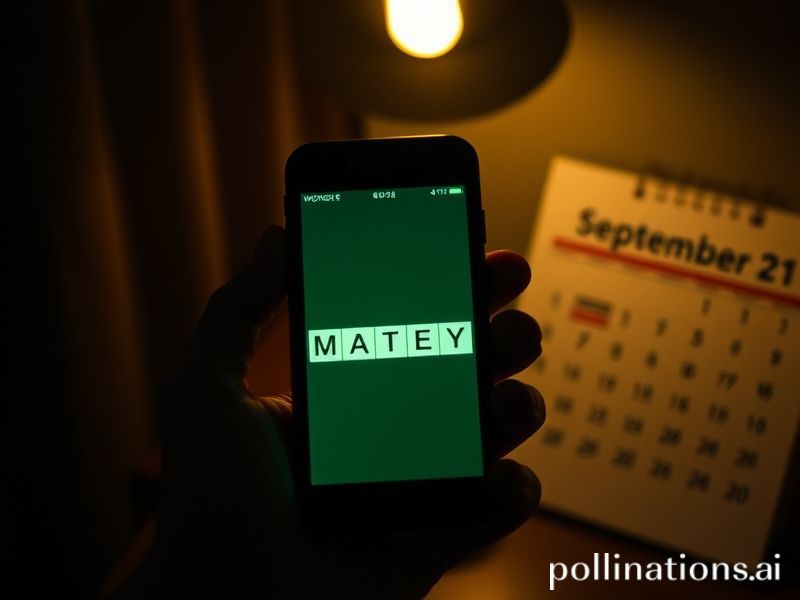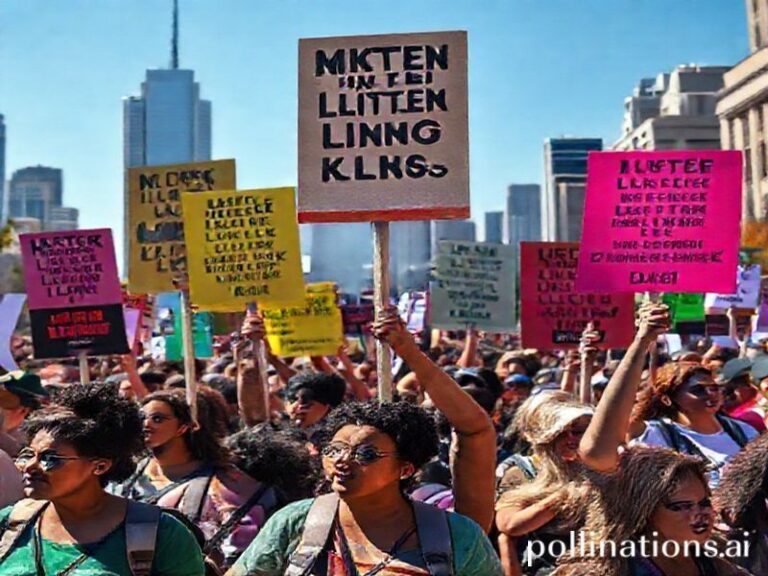PRISM Break: How One Wordle Answer Briefly United—and Divided—the Planet
The Quiet Global Coup of a Five-Letter Word
How September 21’s Wordle answer became the day’s most widely shared state secret—and what that says about the rest of our collapsing order.
By the time the sun had slipped over the international date line on 21 September, roughly 57 million human beings—spread from Lagos dormitories to Lapland saunas—had already solved, surrendered, or sworn at Wordle #1,189. The answer, for those still living under a rock (or merely under sanctions), was “PRISM.” A cheery little noun meaning both a glass bauble that splits light and, coincidentally, an NSA program that splits trust. The universe, ever the ham-fisted satirist, declined to add commentary.
In Nairobi’s iHub, a coder named Achieng cracked it in three tries, then immediately screenshotted her green-and-yellow triumph for the group chat. Six minutes later her cousin in Toronto—who hasn’t voluntarily phoned family since 2018—sent back the same grid, captioned “solidarity.” Somewhere in between, the word had hopped the Atlantic faster than any cargo of actual prisms, which currently languish on a container ship outside Rotterdam because the Rhine is too shallow for barges. Climate change: 0, five-letter dopamine: 1.
Of course, Wordle itself is now a transnational institution, like the IMF but with better graphics and slightly fewer riots. The New York Times purchased it for a sum rumored to be in the “low seven figures”—coincidentally the price of a single Patriot missile, give or take a school. Since then the puzzle has done what every empire eventually attempts: impose a common tongue. Today a rice farmer in rural Myanmar and a bond trader in Frankfurt are judged by the exact same orthographic metric. Progress, surely, tastes like stale communion wafer.
Meanwhile, governments pretended not to notice. The Kremlin issued no bulletin on “PRISM,” though Russian media had spent the previous week warning that Western games were “psychological viruses.” Beijing’s censors allowed the character transliteration “P-R-I-S-M” to trend for precisely 27 minutes, then replaced it with a promoted hashtag about turnip harvests. In Washington, a junior intelligence officer briefly panicked, wondering if the puzzle was a cunning leak operation. He relaxed only after discovering that PRISM the surveillance program had been public knowledge since 2013, which tells you everything about the shelf life of outrage.
But the real marvel was watching the planet’s collective id perform the same micro-ritual in 24 time zones. Cryptocurrency markets dipped 2.3 % at 09:14 UTC, not because of Elon Musk but because a critical mass of day-traders paused to solve Wordle. In Seoul, a BTS fan account posted its grid with the caption “Kim Seokjin would ace this,” which instantly garnered 48,000 likes—roughly triple the engagement on South Korea’s latest defense white paper. Priorities, like sunlight through glass, refract.
Naturally, the losers had their moment too. In Dubai, an influencer live-streamed his sixth and final attempt, guessing “PRICK” before the clock ran out. His subsequent meltdown—captured in 4K portrait mode—was clipped, translated, and meme-ified into 17 languages before he could say “sponsored by Raid Shadow Legends.” Somewhere, Marshall McLuhan is updating his LinkedIn.
And yet, amid the global synchronized eye-roll, a quieter phenomenon unfolded: people talked to each other without arguing about tariffs or vaccine patents. Language barriers fell faster than the British pound; the green square became Esperanto for “I, too, exist.” For three minutes, the algorithmic warrens of Twitter fell silent except for the humble brag of five perfect tiles. The planet’s temperature dipped a metaphorical tenth of a degree.
Then it was over. Everyone returned to doomscrolling about floods, coups, and the price of eggs. But somewhere in the circuitry, the word lingered—PRISM—a reminder that light can be split into a rainbow or into surveillance spectra, depending on which end you’re looking from. Tomorrow’s puzzle will arrive at midnight, universal standard angst. We’ll guess, fail, and try again, because that is still cheaper than therapy and only slightly less effective.
Until then, dear reader, keep your tiles green and your expectations beige. The world is ending, but at least it’s ending on a five-letter schedule.







